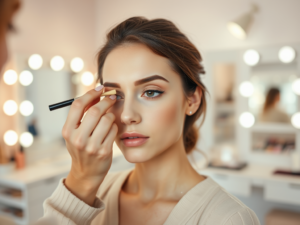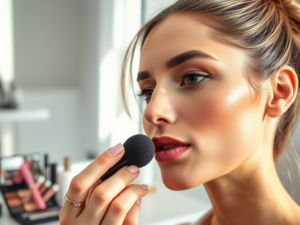Understanding Your Skin Type: The First Step to Smooth Skin
Achieving smooth and radiant skin isn’t a mere product of luck or genetics—it begins with understanding your unique skin type. The foundation of any skincare routine is recognizing what kind of skin you have, as it can make all the difference when selecting products and treatments. When you tailor your skincare to suit your skin type, you set the stage for not just an improved complexion but healthier skin overall.
Every individual has distinct skin characteristics influenced by several factors, including genetics, climate, and lifestyle choices. Often, people misinterpret their skin type due to a lack of knowledge or prevailing beauty myths. Understandably, this leads to confusion and frustration as they navigate the sea of available skincare options. Having clarity on your skin type can diminish the trial-and-error process of experimenting with products, ultimately saving you time, money, and disappointment.
Why Knowing Your Skin Type is Vital

Knowing your skin type is more than just a fun exercise; it’s essential to effective skincare. Different skin types react differently to ingredients—what works wonders for one type may cause irritation or breakouts for another. Understanding your skin type also plays a pivotal role in addressing various skin concerns, such as acne, dryness, or sensitivity. Each skin type exhibits unique challenges, but the right knowledge empowers you to choose suitable products.
Here are key reasons why skin type knowledge is crucial:
- Helps in selecting the right products tailored to your skin’s needs.
- Aids in preventing potential skin issues caused by incompatible products.
- Promotes a targeted approach to treating specific skin conditions.
- Contributes to an effective skincare routine that enhances overall skin health.
The Main Skin Types

Normal Skin
Normal skin typically has a balanced level of moisture and oil. It’s not too oily or too dry, and individuals with this skin type often experience fewer skin issues. The characteristics of normal skin include minimal blemishes and a smooth texture. Maintaining this balance is crucial, and individuals should focus on gentle cleansing and moisturizing.
Benefits of normal skin include:
- Fewer sensitivities or reactions to products.
- Less likelihood of frequent breakouts.
- An even skin tone that allows for versatile makeup applications.
Oily Skin
Oily skin occurs when the sebaceous glands produce excess oil, leading to a shiny complexion. Often, this skin type is prone to acne and enlarged pores. Ingredients like salicylic acid and non-comedogenic products are essential for managing oily skin. While it may seem challenging, proper care can help maintain a healthy balance.
Dry Skin
Dry skin is characterized by a lack of moisture and can feel tight, rough, or flaky. Factors contributing to dryness include weather conditions, dehydration, and aging. People with dry skin need to prioritize hydration and use products that contain nourishing ingredients like hyaluronic acid. Gentle exfoliation can also aid in removing dead skin cells.
Combination Skin
Combination skin features characteristics of more than one skin type, commonly oily in the T-zone and dry on the cheeks. This type requires targeted treatment to address different areas effectively. To manage this skin type, individuals may consider using different products on different sections. Establishing a balanced skincare routine can help maintain harmony across skin zones.
Sensitive Skin
Sensitive skin reacts quickly to various factors like weather, products, or even stress. This skin type is often prone to redness, itching, or burning sensations. Gentle, hypoallergenic products should be a priority for those with sensitive skin. Avoiding fragrance and harsh chemicals can significantly improve skin comfort.
How to Determine Your Skin Type
Determining your skin type may sound complicated, but it can be accomplished at home with a simple assessment. Follow these steps:
- Cleanse your face with a gentle cleanser and wait for an hour.
- Observe how your skin feels during the wait; pay attention to oiliness, dryness, or tightness.
- Assess different areas of your face (forehead, cheeks, nose, chin) to identify variations.
- Consider external factors that may influence your skin type, such as weather or stress.
| Skin Type | Characteristics | Recommended Products |
|---|---|---|
| Normal | Balanced oil and hydration | Gentle cleanser, light moisturizer |
| Oily | Shiny, enlarged pores | Oil-free moisturizer, clay masks |
| Dry | Tight, flaky texture | Rich creams, hydrating serums |
| Combination | Oily T-zone, dry cheeks | Multi-masking products, targeted serums |
| Sensitive | Reacts easily, prone to redness | Fragrance-free products, soothing gels |
Choosing the Right Products for Your Skin Type
Selecting the right products is essential once you identify your skin type. Each skin type has specific ingredients that provide the best results. For instance, if you have oily skin, look for products with salicylic acid that can help mitigate excess oil. Conversely, those with dry skin should seek rich moisturizers containing ingredients like glycerin and ceramides to enhance hydration.
To further aid your selection, consider these tips:
- Read labels and avoid known irritants for your skin type.
- Test new products on a small area before applying them to your entire face.
- Choose products geared towards your specific skin concerns, such as acne or sensitivity.
Building a Routine Based on Skin Type
Creating a skincare routine tailored to your skin type can amplify your results dramatically. Each type benefits from a customized approach, balancing cleansing, exfoliation, and hydration. Here’s a sample routine for each skin type:
- Normal Skin: Cleanse, tone, moisturize, and apply sunscreen.
- Oily Skin: Use a gentle cleanser, an exfoliating toner, oil-free moisturizer, and SPF.
- Dry Skin: Gentle cleansing, rich moisturizer, a hydrating serum, and SPF.
- Combination Skin: Cleanse, use targeted treatment in oily areas, moisture cream, and SPF.
- Sensitive Skin: Gentle cleanse, soothing moisturizer, minimal products, and SPF.
Conclusion
In summary, understanding your skin type is the foundation of a successful skincare regimen. By identifying your unique skin characteristics, you empower yourself to make informed choices about the products you use. This knowledge not only helps in selecting the right skincare items but also fosters a deeper connection with your skin, enhancing both trust and satisfaction in your routines.
Armed with the right insights, you can embark on a journey toward healthier, smoother skin. Embrace the process, celebrate your skin, and make conscious choices that will benefit you for years to come.
Frequently Asked Questions
- What is the best way to care for oily skin?
- Use gentle, non-comedogenic products, and cleanse regularly.
- Can skin types change over time?
- Yes, factors like age, hormones, and environment can cause skin type changes.
- Is it necessary to use different products for different areas of combination skin?
- Yes, targeted products can help address specific concerns in different zones.
- How do I know if a product is suitable for my skin type?
- Look for products labeled for your specific skin type and check for irritants.
- Can diet affect my skin type?
- Yes, a balanced diet can improve skin health and appearance, influencing skin type.







